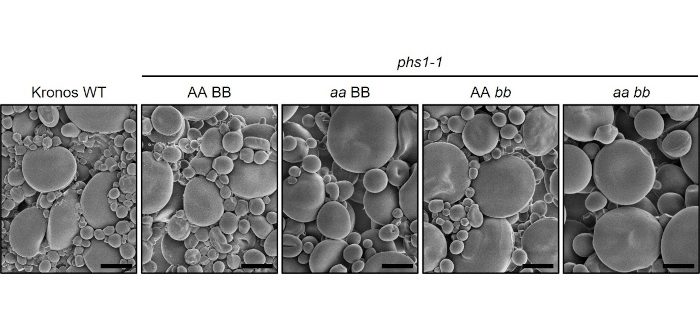Phosphorylase enzyme required for small starch granules in wheat
Nitin Uttam Kamble shows that the enzyme α-glucan phosphorylase interacts with a carbohydrate-binding protein to initiate the formation of small B-type starch granules in wheat.
Nitin Uttam Kamble, Farrukh Makhamadnojov, Brendan Fahy, David Seung
John Innes Centre, Norwich Research Park, NR4 7UH, UK
https://doi.org/10.1093/plcell/koad217
Background: Starch is the main storage carbohydrate in plants and a vital source of calories in human diets. In the Triticeae tribe, which includes wheat, barley and rye, starch forms two distinct types of granules in grain: large discoid A-type granules and small spherical B-type granules. The A-type granules form early during grain development and the B-type granules form later.
Question: We asked whether A- and B-type granules are initiated via similar or distinct biochemical mechanisms. To better understand the mechanism of B-type granule initiation, we looked for interaction partners of B-GRANULE CONTENT1 (BGC1), a carbohydrate-binding protein that is important for B-type granule initiation.
Findings: We discovered that BGC1 interacts with the α-glucan phosphorylase, PHS1, in developing wheat endosperm. PHS1 can efficiently elongate short maltooligosaccharides in vitro, but decades of research have failed to find a clear role for this enzyme in plants. We produced phs1 knockout mutants in wheat and discovered they had fewer B-type granules compared to the wild type. By examining granule formation during grain development in the mutant, as well as double mutant combinations with bgc1, we discovered that loss of PHS1 only affects the formation of B-type granules, not A-type granules. Our findings reveal an indispensable role for PHS1 in wheat and demonstrate that A- and B-type granule initiations occur through distinct biochemical mechanisms.
Next steps: We are investigating whether the other BGC1 interaction partners identified in our study are involved in B-type granule initiation and studying how the actions of these proteins are coordinated. Since B-type granules affect the nutritional and functional properties of wheat, we are testing our phs1 mutants in various industrial applications.
Reference:
Nitin Uttam Kamble, Farrukh Makhamadnojov, Brendan Fahy, Carlo Martins, Gerhard Saalbach, David Seung (2023) Initiation of B-type starch granules in wheat endosperm requires the plastidial α-glucan phosphorylase PHS1. https://doi.org/10.1093/plcell/koad217




